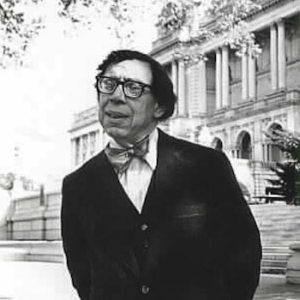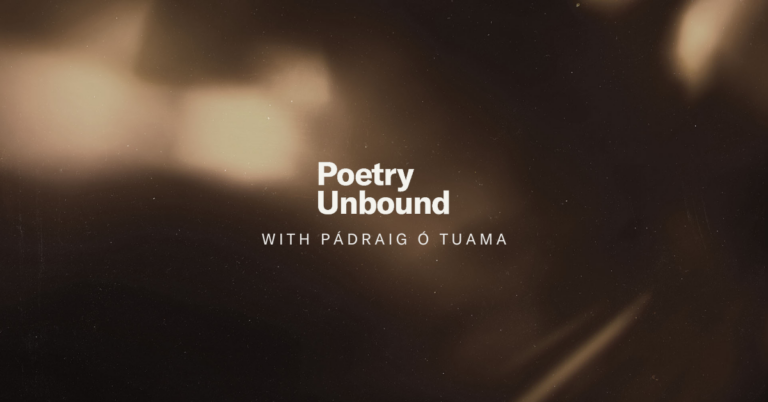Robert Hayden
Those Winter Sundays
What sacrifices were made by your parents when you were a child? How did you think about them as they were happening? And how do you think about them now? In his poem “Those Winter Sundays,” Robert Hayden holds space for a weighted childhood memory and the regret, love, and pain it evokes.
We’re pleased to offer Robert Hayden’s poem and invite you to subscribe to Pádraig’s weekly Poetry Unbound Substack newsletter, read the Poetry Unbound book, or listen to past episodes of the podcast. We also have two books coming out in early 2025 — Kitchen Hymns (new poems from Pádraig) and 44 Poems on Being with Each Other (new essays by Pádraig). You can pre-order them wherever you buy books.
Guest

Robert Hayden (1913-1980) was the first Black American poet to be appointed the Consultant of Poetry to the Library of Congress (now known as the U.S. Poet Laureate); he held this role from 1976 to 1978. Hayden was the recipient of numerous awards, including a Hopwood Award, Academy of American Poets Fellowship, Grand Prize for Poetry at the First World Festival of Negro Arts, and Russell Loines Award for distinguished poetic achievement from the National Institute of Arts and Letters.
Transcript
Transcription by Alletta Cooper
Pádraig Ó Tuama: My name is Pádraig Ó Tuama, and I, like many, many people, spent an enormous amount of my childhood fantasizing and dreaming about leaving my childhood — about leaving home, about growing up, about being different. One of the things that I didn’t understand then is that you take your childhood with you and spend the rest of your life thinking about your childhood. It’s always there. Fortunately, we have poetry as a vehicle where you can examine time, examine yourself, and you can also examine the other people who were present in your childhood.
[music: “Praise the Rain” by Gautam Srikishan]
“Those Winter Sundays” by Robert Hayden
“Sundays too my father got up early
and put his clothes on in the blueblack cold,
then with cracked hands that ached
from labor in the weekday weather made
banked fires blaze. No one ever thanked him.
“I’d wake and hear the cold splintering, breaking.
When the rooms were warm, he’d call,
and slowly I would rise and dress,
fearing the chronic angers of that house,
“Speaking indifferently to him,
who had driven out the cold
and polished my good shoes as well.
What did I know, what did I know
of love’s austere and lonely offices?”
[music: “Ashed to Air” by Gautam Srikishan]
This poem by Robert Hayden, I think might be one of the finest poems I’ve ever read. Including the title, it’s just a hundred words — “Those Winter Sundays” — and it’s a study of compression and form and distillation and voice. I do tend to look at this poem enormously through the lens of time, particularly looking at “Winter Sundays.” “Sundays too,” it starts off with. So he’s saying that Monday, Tuesday, Wednesday, Thursday, Friday, Saturday maybe, but then “Sundays too,” his father gets up early having worked in brutal conditions as a laborer or some kind of worker. “Cracked hands that ached / from labor in the weekday weather.” He is polishing shoes. He’s making the place a little warmer. And there’s anger in the house. There’s impoverishment, perhaps of spirit as well as money.
Robert Hayden was born in Detroit in 1913. And he was fostered by the neighbors, Sue Ellen Westerfield and William Hayden, and his mother lived next door. He had studied, then, in Detroit City College, and he worked for the Federal Writers Project, and he taught at the University of Michigan. He was the first Black American to serve in the role of what was called Consultant in Poetry to the Library of Congress. That title is now Poet Laureate. This particular poem, “Those Winter Sundays,” is from a book titled A Ballad of Remembrance, and that was published in 1962, so when he was approaching 50, in fact, possibly right around the same age that I am now, which is a particular kind of age of feeling in between things — midlife, it’s called. You’re thinking of how close 60, 70 feels, and also how close 20, 30 felt.
There is such sadness in this poem and sadness with regret. And sometimes I think the regret is a bit brutal because he’s asking something of his childhood self that perhaps was impossible. But one of the things he is putting forward is that: are circumstances so difficult that a small amount of gratitude couldn’t have changed it? “No one ever thanked him.” This man was working very hard. There’s a stretched-thin, almost absent, language of love, and this, I think, is what the adult Robert Hayden is trying to put back into that place. He’s trying to recognize that actually there was love there and love comes with “austere and lonely offices” — tasks that are done on a regular basis, that might be the very backdrop upon which there’ll be resentment or indifference or silence.
[music: “Ashed to Air” by Gautam Srikishan]
I often wonder what is it that prompted this poem, and I get the impression that Robert Hayden may have been thinking about this poem for a long time and that he maybe took a long time to write it, certainly. All of his poems are a demonstration of honed, tight, and distilled poetry. I love his work. There’s not too many books of his that are published and each poem feels like it’s been written in rock with such meticulous care. You can see that in the adjectives. There are so many of them in this poem, and they enhance and deepen and expand the poem. The first stanza has four: “the blueblack cold,” “the cracked hands,” “weekday weather,” and “banked fires.” And even in the title, “Those Winter Sundays.” Winter can function as some kind of an adjective in the context of this.
The words “austere” and “offices” are really worthwhile looking at. Offices can mean, of course, a place where you sit down and you put things in a filing cabinet, but it has another meaning, too, when we use the word “officiate.” To officiate means to play a function in a particular place. If you officiate at a wedding, it means that you have a function there. And so love has a function, and these functions are described with two adjectives by Robert Hayden, “lonely” and “austere.”
Austere is a word from Greek, and it has an implication of having a dry tongue. Austerity is a word that we particularly imagined with straightened times or somebody constricting something financially on a broader national level. The father’s actions seemed lonely, now, to Robert Hayden writing years later and seemed also like they were functioning out of a certain kind of dryness or austerity. And the boy was looking for fires of love, but perhaps all that was there was dry kindling to make the house a little bit warm even if the heart couldn’t be warm.
[music: “Ashed to Air” by Gautam Srikishan]
So much of the guiding image, or the heart, of this poem, is the hearth of fire. He lights these fires, “made / banked fires blaze. No one ever thanked him.” Those fires, on the one hand now with the benefit of years, are being looked at as a demonstration and a commitment of love. But fire can burn as well as warm, and perhaps the fire at the time when he was younger was the kind of fire of “the chronic angers of that house” that might be seen as a threat rather than an invitation. One of the things that we’re seeing here is how it is that, as years go by, we begin to change in how we approach and comprehend difficult circumstances.
There’s care in how he does this, too, because he is clear to speak about “the chronic angers of that house.” He doesn’t apologize for it, so he’s not trying to say, oh, that didn’t matter. He is trying to say, multiple things are happening at the same time, and that is the inconvenience of so many of our lives. I think about times in my own life when something brutal was happening and at the same time somebody was trying to be generous, and how difficult it is at the time and, with the benefit of years afterward, to try to figure out, what should I have done? What should I do now? How should I think about it? How do I hold these things? And what you see in Robert Hayden is the capacity to hold them together and to begin to allow time and change and experience and perhaps midlife to do some work on him.
[music: “Ashed to Air” by Gautam Srikishan]
“Those Winter Sundays” by Robert Hayden
“Sundays too my father got up early
and put his clothes on in the blueblack cold,
then with cracked hands that ached
from labor in the weekday weather made
banked fires blaze. No one ever thanked him.
“I’d wake and hear the cold splintering, breaking.
When the rooms were warm, he’d call,
and slowly I would rise and dress,
fearing the chronic angers of that house,
“Speaking indifferently to him,
who had driven out the cold
and polished my good shoes as well.
What did I know, what did I know
of love’s austere and lonely offices?”
[music: “Praise the Rain” by Gautam Srikishan]
Chris Heagle: “Those Winter Sundays” comes from Robert Hayden’s Collected Poems. Thank you to W. W. Norton & Company who gave us permission to use Robert’s poem. Read it on our website at onbeing.org.
[music: “Praise the Rain” by Gautam Srikishan]
Poetry Unbound is: Gautam Srikishan, Eddie Gonzalez, Lucas Johnson, Kayla Edwards, Tiffany Champion, Cameron Musar, and me, Chris Heagle.
Our music is composed and provided by Gautam Srikishan and Blue Dot Sessions.
This podcast is produced by On Being Studios, which is located on Dakota land. Open your world to poetry with us by subscribing to our Substack newsletter. For links and to find out more visit poetryunbound.org.
Books & Music
Recommended Reading
The On Being Project is an affiliate partner of Bookshop.org and Amazon.com. Any earnings we receive through these affiliate partnerships go into directly supporting The On Being Project.







